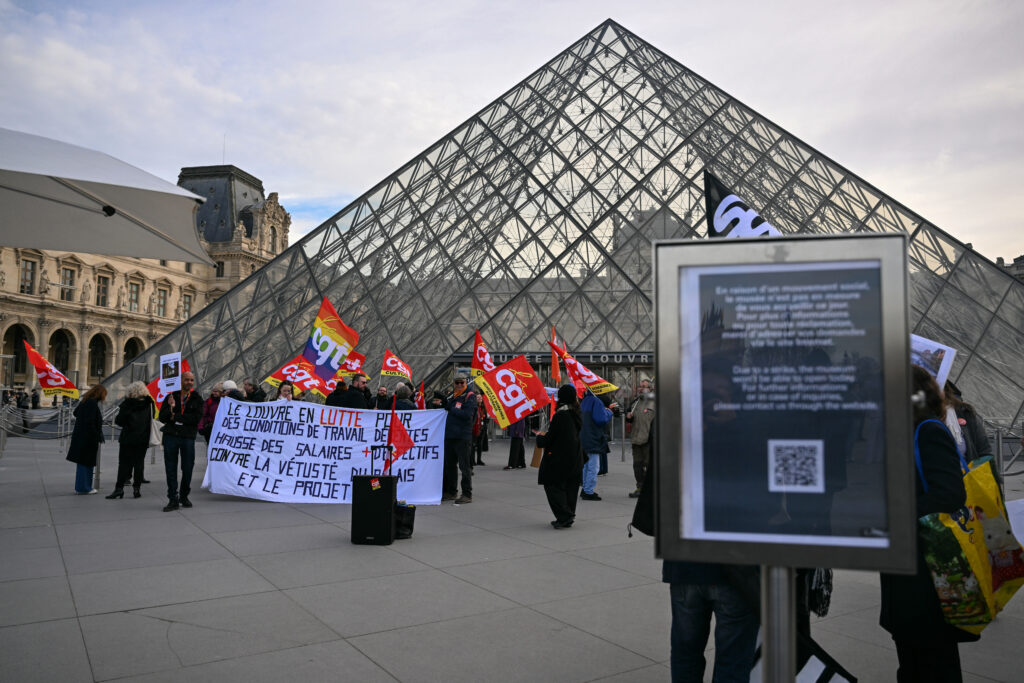AG à enjeu au Louvre: les salariés se réunissent mercredi matin pour reconduire ou non la grève qui a empêché le musée d’ouvrir lundi, nouvelle épreuve pour un établissement en crise dont la présidente est réentendue en fin de journée au Sénat sur les failles de sécurité.Dans la tourmente depuis le casse du 19 octobre, le Louvre a gardé ses portes closes lundi après la décision unanime de quelque 400 agents de débrayer contre les problèmes de sous-effectif, la dégradation du bâtiment ou la hausse des tarifs pour les non-Européens.Partagés entre déception et résignation, les touristes, nombreux en cette fin d’année, ont dû rebrousser chemin et vont guetter l’issue de l’assemblée générale prévue mercredi à 09H00, qui doit décider des suites d’un mouvement rare par son ampleur. Le musée parisien est resté clos mardi, son jour de fermeture hebdomadaire.Lundi, une réunion de crise a eu lieu avec les syndicats au ministère de la Culture, en première ligne dans ce dossier, pour répondre à la colère des agents, également nourrie par la succession d’avanies depuis le cambriolage (fermeture d’une galerie, ouvrages anciens endommagés par une fuite…).”Il y a une grande exaspération des agents”, affirme à l’AFP Christian Galani, délégué CGT, syndicat majoritaire au Louvre. “On ne sait pas ce que ça va donner en AG mais ce n’est pas en donnant un petit os que ça va se régler”.Outre l’annulation de la baisse prévue de 5,7 millions d’euros de dotation au Louvre pour 2026, le ministère propose d’ouvrir des recrutements dédiés à l’accueil et la surveillance du musée et une revalorisation indemnitaire que les syndicats voudraient pérenne. Trois réunions ont déjà eu lieu au ministère la semaine dernière, dont l’une avec Rachida Dati, sans parvenir à empêcher la fermeture du musée le plus visité au monde.- Désaveu -Fragilisée encore davantage par ce conflit social, la présidente du Louvre passera, à partir de 16H30, de nouveau sur le gril de la commission de la culture du Sénat, qui cherche à éclairer les failles sécuritaires du musée.Le 22 octobre, trois jours après le vol des huit joyaux de la Couronne, Laurence des Cars avait déjà reconnu un “échec” devant les sénateurs mais défendu son action, en assurant notamment avoir “accéléré l’élaboration” du schéma directeur de sûreté.Depuis, des révélations embarrassantes ont toutefois affaibli la dirigeante, arrivée à la tête du musée fin 2021.Laurence des Cars a dû reconnaître n’avoir eu connaissance d’un audit sécuritaire alarmant de 2019 qu’après le casse et la Cour des comptes a récemment pointé le “report persistant” affectant le schéma directeur de sûreté, dont la mise en œuvre n’a pas encore débuté.La gestion de la sécurité du musée au cours des dernières années a également été étrillée par l’enquête administrative lancée après le cambriolage.Entendu la semaine dernière au Sénat, Noël Corbin, un des responsables de l’enquête, a confessé avoir été “très fortement surpris” de constater qu’un musée comme le Louvre “puisse être aussi fragile”.Sous pression, le Louvre a annoncé début novembre des mesures d’urgence, dont l’installation de dispositifs “anti-intrusion”. Mais, signe de désaveu, la ministre de la Culture a confié à Philippe Jost, en charge du chantier de Notre-Dame, une mission de deux mois pour réorganiser le musée au côté de Mme des Cars.Mardi, l’ancien président du Louvre, destinataire de deux audits sécuritaires alarmants pendant son double mandat (2013-2021), a défendu son action dans ce domaine, lui qui a jusqu’à présent été épargné par la polémique.”Contrairement à ce que j’ai lu, la culture de la prévention contre le vol n’avait pas disparu”, a assuré Jean-Luc Martinez lors d’une audition au Sénat.L’ancien dirigeant a également contesté toute déperdition d’information lors du passage de relais fin 2021 à Laurence des Cars, qui assure pourtant n’avoir eu connaissance de l’existence d’audits cruciaux qu’après le cambriolage. “Il y a eu continuité de service”, a-t-il soutenu.




